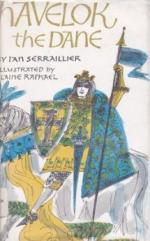With that he hastened on deck, and told the men what he would do; and they thought it a good plan, as maybe they would have deemed anything that seemed to call for help from the strong ones of the sea. So they got the boat ready to launch over the quarter, and the four stones, being uncovered since the Vikings took our cargo, were easily got on deck, and they were placed in the bottom of the boat, and steadied there with coils of fallen rigging, so that they could not shift. They were just a fair load for the boat. Then my father cried for help to the Asir, bidding Aegir take the altar as full sacrifice; and when we had done so we waited for a chance as a long wave foamed past us, and launched the boat fairly on its back, so that she seemed to fly from our hands, and was far astern in a moment.
Now we looked to see her make straight for the breakers, lift on the first of them, and then capsize. That first line was not a quarter of a mile from us now.
But she never reached them. She plunged away at first, heading right for the surf, and then went steadily westward, and up the shore line outside it, until she was lost to sight among the wild waves, for she was very low in the water.
“Cheer up, men,” my father said, as he saw that; “we are not ashore yet, nor will be so long as the tide takes that current along shore. We shall stop dragging directly.”
And so it was, for when the ship slowly came to the place where the boat had changed her course, the anchor held once more for a while until the gathering strength of the tide forced it to drag again. Now, however, it was not toward the shore that we drifted, but up the Humber, as the boat had gone; and as we went the sea became less heavy, for we were getting into the lee of the Spurn headland.
Soon the clouds began to break, flying wildly overhead with patches of blue sky and passing sunshine in between them that gladdened us. The wind worked round to the eastward at the same time, and we knew that the end of the gale had come. But, blowing as it did right into the mouth of the river, the sea became more angry, and it would be worse yet when the tide set again outwards. Already we had shipped more water than was good, and we might not stand much more. It seemed best, therefore, to my father that we should try to run as far up the Humber as we might while we had the chance, for the current that held us safe might change as tide altered in force and depth.
So we buoyed the cable, not being able to get the anchor in this sea, and then stepped the yard in the mast’s place, and hoisted the peak of the sail corner-wise as best we might; and that was enough to heel us almost gunwale under as the cable was slipped and the ship headed about up the river mouth. We shipped one or two more heavy seas as she paid off before the wind, but we were on the watch for them, and no harm was done.
After that the worst was past, for every mile we flew over brought us into safer waters; and now we began to wonder where the boat with its strange cargo had gone, and we looked out for her along the shore as we sailed, and at last saw her, though it was a wonder that we did so.




